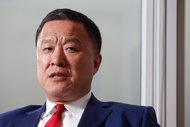4:01 p.m. | Updated
 Tyrone Siu/ReutersBarry Cheung, the chairman of the Hong Kong Mercantile Exchange, took an abrupt leave of absence from all public service posts.
Tyrone Siu/ReutersBarry Cheung, the chairman of the Hong Kong Mercantile Exchange, took an abrupt leave of absence from all public service posts.
The Hong Kong securities regulator announced on Tuesday that it had discovered possible financial irregularities at the Hong Kong Mercantile Exchange and said it referred the matter over to the police for investigation.
The exchange ceased business over the weekend and has since wound down all open trading positions. The suspected irregularities were “serious ones,’’ Hong Kong’s Securities and Futures Commission said in a statement.
Barry Cheung, the chairman and controlling shareholder of the mercantile exchange, took an abrupt leave of absence Tuesday night from all public service positions, according to a statement issued by the office of the head of the Hong Kong government, Leung Chun-ying.
Mr. Cheung also serves as an unofficial member of Mr. Leung’s cabinet and heads the government’s neighborhood redevelopment agency, the Urban Renewal Authority. He also ran Mr. Leung’s election campaign last year.
In the corporate world, Mr. Cheung is a director of the AIA Group, formerly a unit of the American International Group, and is also on the board of Rusal, the aluminum company controlled by the Russian billionaire Oleg Deripaska. Both those companies are listed in Hong Kong.
The Hong Kong Mercantile Exchange, or HKMEx, opened for business two years ago and aimed to be a global platform for investors seeking to tap into China’s tremendous demand for commodities. The exchange, which is privately held, boasted an influential group of minority shareholders, which included Mr. Deripaska’s Eni+, a unit of the Chinese shipping company Cosco Group and a unit of the Industrial and Commercial Bank of China, the world’s biggest bank by market value.
But trading volumes on the HKMEx never came close to rivaling more established peers like the Chicago Mercantile Exchange, the IntercontinentalExchange or the London Metal Exchange. Only two products ever traded in Hong Kong — a gold futures and a silver futures contract, both denominated in United States dollars.
A local stock exchange operator, Hong Kong Exchanges and Clearing, completed its $2.2 billion acquisition of the London Metals Exchange in December.
Mr. Cheung has not been accused of any wrongdoing. In a statement, he said: “As HKMEx is now under police investigation, I cannont make any comments at this stage aside from that I personally and HKMEx are cooperating fully in the investigation. I feel that it is inappropriate for me to continue my public duties during the investigation.”
In his statement on Tuesday, Mr. Leung, the head of the local government, said: ‘’I am confident the regulatory and law enforcement bodies will act impartially without fear or favor.”
The police in Hong Kong said in a statement that they had arrested a 55-year-old man on charges of ‘‘using a false instrument’’ involving a commodities trading company. The man was not formally charged, but was detained overnight for questioning. Further details were not available.
The Securities and Futures Commission said it began investigating financial irregularities last Wednesday, but waited until Tuesday to make its announcement: “For obvious reasons, it was not appropriate to disclose these matters to HKMEx or to the public pending further steps in the investigation,” the regulator said in its statement.
This post has been revised to reflect the following correction:
Correction: May 21, 2013
An earlier version of this article misidentified the former corporate parent of the AIA Group. It is the American International Group, not the American Insurance Group.
Article source: http://dealbook.nytimes.com/2013/05/21/regulators-in-hong-kong-suspect-financial-irregularities-at-mercantile-exchange/?partner=rss&emc=rss